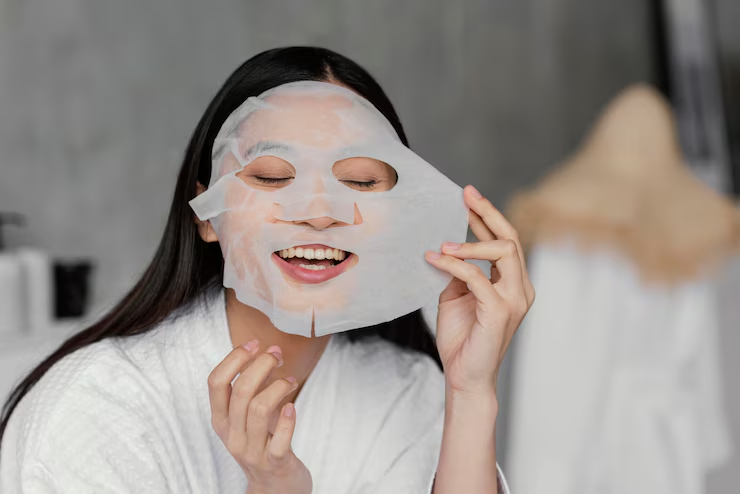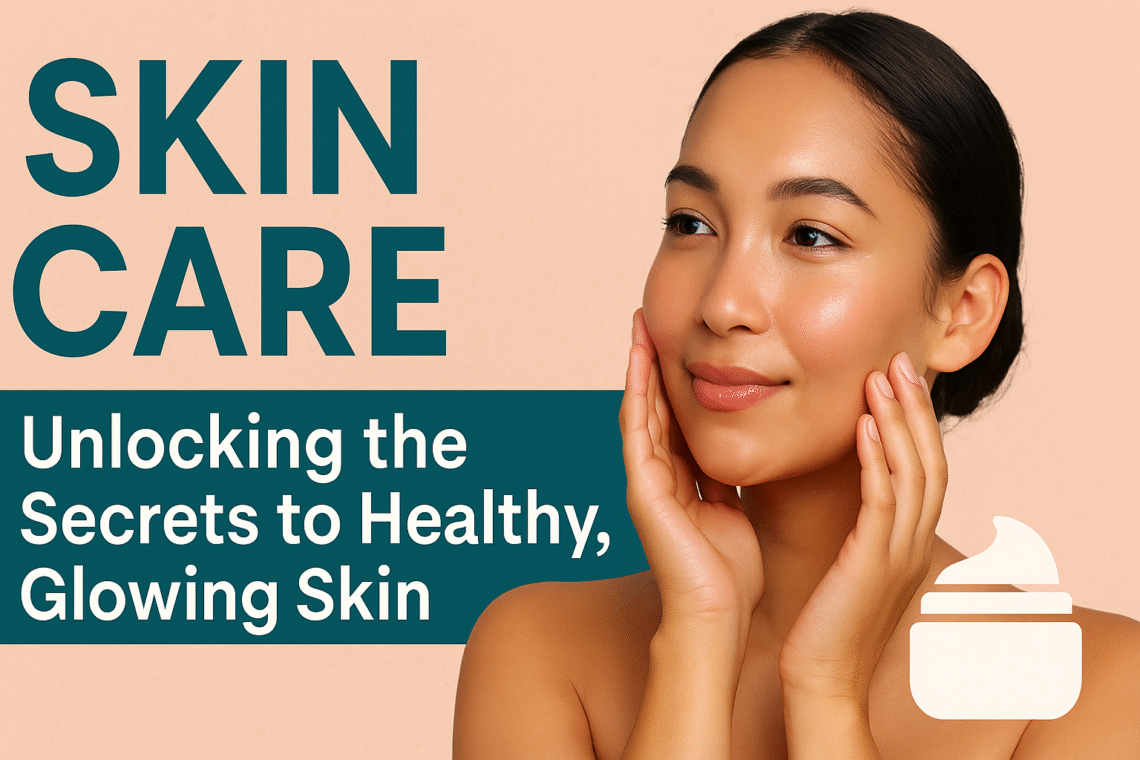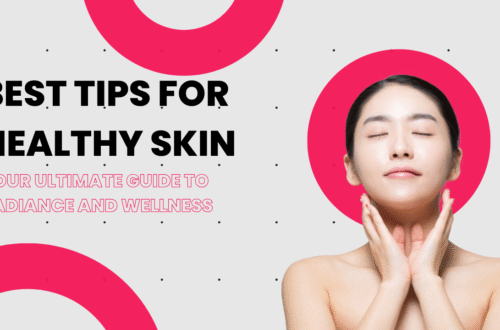Our skin is the largest organ in the human body, and it deserves all the love and attention we can give it. While genetics play a significant role in how our skin looks and feels, a good skin care routine can make a remarkable difference. From protecting against harmful elements to enhancing natural beauty, skin care is an essential part of self-care.
Healthy, glowing skin doesn’t happen by accident — it’s the result of a consistent and thoughtful skin care routine. Understanding the science behind skin care is the first step to achieving your best complexion. From the structure of the skin to how it reacts to different ingredients, knowing these basics helps you make informed choices that truly benefit your skin. Whether you have dry, oily, sensitive, or combination skin, a personalized approach to skin care can transform your look and confidence.
Alongside the science, it’s important to separate facts from fiction. Many skin care myths can lead to poor habits, such as skipping sunscreen on cloudy days or believing oily skin doesn’t need moisturizer. By learning the truth behind these myths, you can protect your skin from damage and premature aging. Practical tips, like staying hydrated, managing stress, and choosing non-comedogenic products, further enhance your skin care routine and overall skin health.
Finally, following the top 8 essential skin care steps ensures you cover all the basics: cleansing, exfoliating, toning, using serums, applying eye cream, moisturizing, protecting with sunscreen, and using masks. With the right skin care routine tailored to your needs, you can achieve a radiant, youthful glow that lasts.
Why Skin Care Matters

Skin care isn’t just about looking good; it’s about maintaining the health of your skin. Here’s why it’s important:
- Protection: Skin acts as a barrier against pollutants, bacteria, and UV radiation.
- Prevention: A consistent routine can help prevent acne, dryness, and premature aging.
- Repair: Helps in the regeneration of skin cells and healing minor damage.
- Confidence Boost: Healthy, glowing skin often boosts self-esteem and confidence.
Understanding Your Skin Type
Before diving into a skin care routine, it’s crucial to understand your skin type. Here are the main types:
- Normal: Balanced, not too oily or dry.
- Oily: Prone to excess sebum production, resulting in shiny skin and clogged pores.
- Dry: Lacks moisture, may feel tight or flaky.
- Combination: Oily in some areas (usually the T-zone) and dry or normal in others.
- Sensitive: Easily irritated by products or environmental factors.
Identifying your skin type helps you choose the right products and tailor your routine effectively.
Top 8 Skin Care Steps/Products
1. Cleansing: The Foundation of Skin Care
Cleansing is the foundation of any effective skin care routine. It is the most basic yet crucial step to achieving healthy, radiant skin. Throughout the day, your skin collects dirt, oil, sweat, makeup, and environmental pollutants that can clog pores and cause breakouts. Without proper cleansing, these impurities build up, leaving your skin looking dull and tired. A good cleanser works to remove all these unwanted elements gently, preparing your skin for the next steps in your skin care routine.
A well-chosen cleanser ensures your skin is clean without stripping away its natural moisture barrier. Whether you prefer a gel, foam, cream, or oil-based cleanser, choosing one that suits your skin type is essential. Using lukewarm water and massaging the cleanser in gentle, circular motions helps improve blood circulation and ensures a deeper clean. For those who wear heavy makeup or sunscreen, double cleansing — starting with an oil-based cleanser followed by a water-based one — can be especially effective.
Proper cleansing allows your skin to fully absorb the benefits of other skin care products, such as serums, moisturizers, and treatments. Skipping this step or doing it incorrectly can make even the most expensive skin care products ineffective. By committing to thorough cleansing every morning and evening, you set the stage for a successful skin care routine and glowing, healthy skin.
Types of cleansers:
- Gel cleansers: Great for oily and acne-prone skin.
- Cream cleansers: Ideal for dry or sensitive skin as they are more hydrating.
- Foam cleansers: Suitable for combination skin types.
- Oil cleansers: Excellent for removing heavy makeup and sunscreen.
How to cleanse properly:
- Wash your face twice a day — morning and night.
- Use lukewarm water to open pores and avoid stripping natural oils.
- Massage gently in circular motions for at least 30–60 seconds.
2. Exfoliation: Reveal Fresh Skin

Exfoliation is a key step in any effective skin care routine, yet it is often overlooked. Over time, dead skin cells build up on the surface, making your skin look rough, dull, and uneven. By gently removing these dead cells through exfoliation, you reveal fresher, more radiant skin underneath. This process not only improves the skin’s appearance but also keeps pores clear, reducing the risk of blackheads and breakouts.
There are two main types of exfoliation used in skin care: physical and chemical. Physical exfoliants include scrubs with small particles or cleansing brushes, which manually slough off dead skin. Chemical exfoliants, on the other hand, use active ingredients like alpha hydroxy acids (AHAs) or beta hydroxy acids (BHAs) to dissolve dead cells. Choosing the right method depends on your skin type and sensitivity. Regular exfoliation, about one to three times a week, helps maintain smooth and glowing skin without causing irritation.
A strong exfoliation routine also enhances the effectiveness of your other skin care products. Once the barrier of dead cells is removed, serums, moisturizers, and treatments can penetrate deeper and work better. By adding exfoliation to your skin care regimen, you support overall skin health and achieve a softer, brighter, and more youthful complexion.
Types of exfoliants:
- Physical exfoliants: Scrubs with small particles or brushes.
- Chemical exfoliants: Contain acids like AHAs (glycolic, lactic acid) or BHAs (salicylic acid).
How often to exfoliate:
- 1–3 times a week depending on your skin type and tolerance.
- Sensitive skin types should exfoliate less frequently and avoid harsh scrubs.
3. Toning: Balance and Prep
Toners are an essential yet often underestimated part of a complete skin care routine. After cleansing, your skin’s natural pH balance can become disrupted, leaving it more vulnerable to dryness and irritation. Using a toner helps bring your skin back to its ideal pH level, which strengthens the skin barrier and improves overall skin health. By maintaining this balance, your skin feels calmer, fresher, and more comfortable throughout the day.
Beyond pH restoration, toners play a crucial role in prepping your skin for the next steps in your skin care routine. They help create the perfect base for serums and moisturizers by allowing them to absorb more effectively. This means your skin can fully benefit from all the active ingredients in your other products. Many modern toners also include hydrating, soothing, or exfoliating ingredients that add an extra layer of treatment to your daily regimen, making them a versatile addition to any skin care plan.
In addition, toners help remove any leftover impurities or traces of cleanser that may still be on your skin. By sweeping away these remnants, they ensure your face is perfectly clean and ready for nourishment. Incorporating a toner into your skin care routine can greatly enhance your results, leaving your skin feeling revitalized, smooth, and glowing.
Types of toners:
- Hydrating toners: Add moisture, great for dry skin.
- Exfoliating toners: Contain mild acids for gentle daily exfoliation.
- Soothing toners: Contain ingredients like chamomile or aloe for sensitive skin.
Application tip:
- Use a cotton pad or pat directly with your hands.
- Apply while your skin is still slightly damp to maximize absorption.
4. Serums: The Treatment Powerhouse

Serums are powerful additions to any skin care routine, specially formulated to target specific skin concerns with precision. Unlike heavier creams, serums have a lightweight and fluid texture that allows them to penetrate deeply into the skin. This makes them especially effective for delivering a high concentration of active ingredients directly where they’re needed most. Whether you’re struggling with dark spots, fine lines, wrinkles, or persistent dryness, a serum can be your go-to solution for noticeable improvement.
In modern skin care, serums are often packed with potent ingredients such as vitamin C for brightening, hyaluronic acid for intense hydration, retinol for boosting cell turnover, and niacinamide for balancing and soothing the skin. By choosing the right serum for your skin type and concerns, you can greatly enhance your routine and achieve more radiant, even-toned, and youthful-looking skin. Using serums consistently can make a significant difference, transforming dull or tired skin into a healthy, glowing complexion over time.
The best time to apply a serum is after cleansing and toning but before moisturizing. This ensures the ingredients can sink deeply into the skin without barriers. Incorporating a serum into your daily skin care regimen can elevate your results, making your skin care routine more personalized, effective, and truly transformative.
Popular serum ingredients:
- Vitamin C: Brightens skin and fights free radical damage.
- Hyaluronic acid: Provides intense hydration.
- Retinol: Encourages cell turnover and reduces signs of aging.
- Niacinamide: Minimizes pores and evens out skin tone.
How to use:
- Apply after toner and before moisturizer.
- Use 1–2 drops and gently press into the skin.
5. Eye Cream: Target the Delicate Area
The skin around your eyes is one of the most delicate areas on your face, requiring special attention in your daily skin care routine. Because this skin is thinner and more sensitive, it is often the first place to show signs of aging, such as fine lines, wrinkles, and sagging. Additionally, factors like lack of sleep, stress, and genetics can cause puffiness and dark circles, making you look tired and older than you feel. Addressing these concerns early is essential for maintaining a youthful and refreshed appearance.
Eye creams are specifically designed to tackle these unique challenges. Unlike regular facial moisturizers, eye creams contain targeted ingredients that deliver extra hydration and treatment without irritating the delicate eye area. Popular ingredients include peptides to boost firmness, hyaluronic acid to plump fine lines, and caffeine to reduce puffiness and brighten dark circles. By incorporating an eye cream into your skin care regimen, you can improve elasticity, smooth out lines, and minimize unwanted shadows under the eyes.
Applying eye cream correctly is just as important as choosing the right formula. Use your ring finger to gently tap the product around the orbital bone, avoiding harsh rubbing. Adding this extra step to your skin care routine helps protect and rejuvenate this delicate area, leaving your eyes looking brighter and more youthful.
Benefits of eye cream:
- Reduces puffiness and under-eye bags.
- Smoothens fine lines and crow’s feet.
- Brightens dark circles.
Application tip:
- Use your ring finger to gently tap (never rub) the product under the eyes.
6. Moisturizing: Lock in Hydration
Moisturizers help seal in moisture, maintain the skin’s barrier, and keep it soft and supple.
Types of moisturizers:
- Gel moisturizers: Lightweight, ideal for oily or acne-prone skin.
- Cream moisturizers: Richer, suitable for dry or mature skin.
- Lotions: Lighter than creams but more hydrating than gels, good for normal or combination skin.
How to apply:
- Apply while skin is still slightly damp to seal in hydration.
- Don’t forget the neck and décolletage area.
7. Sun Protection: Your Best Anti-Aging Step
Sunscreen is undoubtedly one of the most important steps in any skin care routine. No matter how many high-quality products you use, skipping sunscreen can undo all your efforts. Ultraviolet (UV) rays from the sun penetrate the skin deeply, causing immediate and long-term damage. Even on cloudy or rainy days, these rays can still reach your skin, making daily sun protection an absolute must. Including sunscreen in your daily skin care regimen helps maintain healthy, youthful-looking skin for years to come.
Consistent use of sunscreen prevents a wide range of skin concerns. UV exposure is the leading cause of premature aging, resulting in fine lines, wrinkles, and loss of elasticity. It also contributes to hyperpigmentation, dark spots, and uneven skin tone, which can be difficult to treat later. Most importantly, regular sunscreen application significantly reduces the risk of developing skin cancer. By shielding your skin from harmful rays, sunscreen acts as a protective barrier and is an essential part of a holistic skin care approach.
Choosing the right sunscreen is key to effective skin care. Look for broad-spectrum formulas with at least SPF 30 to protect against both UVA and UVB rays. Apply generously as the final step in your morning skin care routine and reapply throughout the day, especially when spending time outdoors. By making sunscreen a daily habit, you safeguard your skin’s health and preserve its natural beauty.
Types of sunscreens:
- Physical (mineral): Contains zinc oxide or titanium dioxide, reflects UV rays.
- Chemical: Absorbs UV rays, often lighter in texture.
How to use:
- Apply at least SPF 30 daily, even on cloudy days or indoors if near windows.
- Reapply every 2 hours when outdoors.
8. Masks: Boost and Treat

Face masks are a powerful addition to any skin care routine, offering an intensive treatment boost that targets specific skin concerns. While daily products like cleansers and moisturizers maintain your skin’s health, face masks deliver a concentrated dose of active ingredients for deeper, more noticeable results. Whether your skin is feeling dull, dry, congested, or irritated, there’s a mask designed to provide immediate relief and rejuvenation. By adding face masks to your regular skin care regimen, you can enjoy a spa-like experience right at home.
There are many different types of face masks to choose from, depending on your skin care needs. Clay masks help absorb excess oil and unclog pores, making them ideal for oily and acne-prone skin. Hydrating masks infused with ingredients like hyaluronic acid and aloe vera provide an instant moisture boost for dry or sensitive skin. Brightening masks with vitamin C or exfoliating enzymes can help improve skin tone and restore radiance. By choosing the right face mask, you can give your skin exactly what it craves.
For best results, incorporate a face mask into your skin care routine once or twice a week. Apply it to clean skin and leave it on for the recommended time to let the active ingredients work their magic. This self-care step not only enhances your skin’s appearance but also offers a moment of relaxation and pampering. With consistent use, face masks can transform your skin care routine and leave your complexion looking refreshed, glowing, and revitalized.
Types of masks:
- Clay masks: Absorb excess oil, detoxify pores.
- Sheet masks: Hydrating and soothing.
- Sleeping masks: Deliver deep hydration overnight.
- Peel-off masks: Remove impurities and dead skin cells.
How often to use:
- 1–2 times a week, depending on your skin’s needs.
Additional Skin Care Tips
Eat and Hydrate Well
When it comes to achieving beautiful skin, what you put into your body is just as important as the products you use in your skin care routine. Your diet plays a crucial role in determining how your skin looks and feels. A balanced diet that includes plenty of fruits, vegetables, lean proteins, and healthy fats provides essential vitamins, minerals, and antioxidants that support overall skin health. These nutrients help fight free radicals, reduce inflammation, and promote a naturally radiant glow from within.
Fruits and vegetables, such as berries, leafy greens, and carrots, are rich in vitamins like C and E, which help boost collagen production and protect against environmental damage. Lean proteins from fish, chicken, and plant-based sources aid in repairing skin tissue and maintaining firmness. Healthy fats found in avocados, nuts, and olive oil keep your skin soft, supple, and hydrated. When you nourish your body with these skin-loving foods, your skin care results are enhanced, making your complexion appear healthier and more youthful.
In addition to a nutritious diet, staying hydrated is vital for effective skin care. Drinking plenty of water throughout the day helps flush out toxins and keeps your skin moisturized from the inside out. Proper hydration supports your skin’s natural barrier and prevents dryness and dullness. By combining a thoughtful diet with a consistent skin care routine, you can achieve truly glowing, vibrant skin that reflects your inner health.
Get Enough Sleep
Beauty sleep isn’t just a catchy phrase — it’s a vital part of any effective skin care routine. While you sleep, your body enters repair mode, working to regenerate and restore cells, including skin cells. This natural overnight healing process helps fix daily damage caused by environmental stressors like UV rays and pollution. Getting enough restful sleep allows your skin to renew itself, resulting in a healthier, more radiant complexion when you wake up.
Lack of sleep can have noticeable effects on your skin, including dark circles, puffiness, and a dull, tired appearance. Over time, chronic sleep deprivation can accelerate signs of aging such as fine lines and sagging, making your skin look older than it is. By prioritizing 7–9 hours of quality sleep each night, you support your skin’s natural repair cycle and maximize the benefits of your skin care products. Ingredients like retinol and peptides work better when the skin is in a rested state, enhancing your overall results.
Incorporating good sleep hygiene into your skin care strategy is just as important as using the right serums and moisturizers. Create a calming bedtime routine, avoid screens before bed, and make your sleeping environment comfortable and dark. By treating sleep as an essential step in your skin care regimen, you help maintain youthful, glowing skin and boost your overall health and well-being.
Avoid Smoking and Limit Alcohol
Lifestyle habits play a crucial role in your overall skin care success. Smoking, for example, is one of the most damaging habits for your skin. It reduces blood flow and deprives skin cells of oxygen and essential nutrients, leading to a dull, uneven complexion. Over time, smoking breaks down collagen and elastin, the fibers that keep your skin firm and elastic, causing premature wrinkles and sagging. By quitting smoking, you not only improve your overall health but also give your skin a better chance to heal and look more youthful.
Excessive alcohol consumption is another major enemy of effective skin care. Alcohol acts as a diuretic, which means it dehydrates your body and, consequently, your skin. Dehydrated skin appears dry, flaky, and more prone to fine lines. In addition to dryness, alcohol can dilate blood vessels, leading to persistent redness and even triggering breakouts or worsening existing skin conditions like rosacea. Cutting back on alcohol or avoiding it altogether can greatly improve your skin’s clarity and hydration levels.
Incorporating healthy lifestyle choices is an essential extension of any skin care routine. By avoiding smoking and limiting alcohol, you support your skin from the inside out. Combined with a good skin care regimen, these changes help promote a smoother, more radiant, and youthful-looking complexion that truly reflects your commitment to self-care.
Manage Stress
Managing stress is an often-overlooked but essential part of an effective skin care routine. When you’re stressed, your body produces higher levels of cortisol and other stress hormones, which can trigger inflammation and worsen skin issues like acne, eczema, and psoriasis. Stress can also disrupt your skin’s natural barrier, making it more prone to irritation, dryness, and breakouts. By learning to manage stress, you support your skin’s health and improve the overall results of your skin care efforts.
Incorporating relaxation techniques into your daily routine can make a significant difference. Activities like yoga, meditation, and deep breathing exercises help calm your mind and reduce cortisol levels, promoting a sense of inner peace. These practices not only benefit your mental well-being but also enhance your skin care results by reducing flare-ups and maintaining a healthy glow. Even dedicating time to hobbies you enjoy, such as painting, reading, or gardening, can be powerful stress relievers that positively impact your skin.
Combining stress management with a consistent skin care routine creates a strong foundation for clear and radiant skin. By taking care of both your mind and body, you address the root causes of many skin concerns and promote long-term skin health. Remember, true beauty shines brightest when you nurture yourself inside and out
Exercise Regularly
Exercise is a powerful yet often underestimated part of a complete skin care routine. When you work out, your heart rate increases and blood circulation improves throughout your body, including your skin. This boost in circulation helps deliver oxygen and essential nutrients to skin cells, supporting their health and natural repair processes. As a result, regular exercise can contribute to a clearer, more radiant complexion and help your skin look fresh and revitalized.
In addition to nourishing the skin, exercise also plays an important role in reducing stress — a major trigger for various skin problems such as acne, eczema, and premature aging. Physical activity encourages the release of endorphins, also known as “feel-good” hormones, which help improve mood and lower stress levels. Lower stress means fewer flare-ups and a more balanced, glowing appearance. Incorporating exercise into your lifestyle complements your daily skin care routine and maximizes your skin’s overall health and vitality.
Sweating during a workout also helps flush out toxins from your pores, further supporting your skin care goals. However, it’s important to cleanse your skin after exercising to remove sweat and prevent clogged pores. By combining regular exercise with a dedicated skin care regimen, you create a holistic approach that enhances both your physical health and your natural beauty, leaving you with truly radiant, healthy skin.
3. Natural products are always better
While natural ingredients are often celebrated for their purity and simplicity, it’s important to remember that not everything from nature is automatically safe for your skin. In fact, some natural substances can cause irritation, allergic reactions, or even long-term damage if used improperly. For example, lemon juice is commonly recommended in DIY skin care recipes for its brightening properties, but its high acidity can disrupt your skin’s barrier, leading to redness, dryness, and increased sensitivity to the sun.
Incorporating natural ingredients into your skin care routine can be beneficial when done thoughtfully and safely. It’s crucial to research each ingredient thoroughly and understand its effects on your specific skin type and concerns. Just because an ingredient is labeled “natural” doesn’t mean it’s gentle or effective for everyone. Always consider whether it has been dermatologically tested or recommended by skin care professionals before applying it to your face.
One essential step in safe skin care is performing a patch test before using any new product or ingredient. Apply a small amount on a discreet area, such as behind your ear or on your wrist, and wait 24–48 hours to see if any reaction occurs. By patch testing and educating yourself about ingredients, you can enjoy the benefits of natural elements in your skin care routine without risking irritation or harm, ensuring your skin stays healthy and radiant.
4. You can shrink your pores
Many people are constantly searching for skin care products that promise to “shrink” pores, but the truth is that pore size is primarily determined by genetics. This means you can’t permanently reduce the size of your pores, no matter how many treatments or creams you try. However, you can take steps to minimize their appearance and keep them looking as refined as possible. Understanding this helps set realistic expectations and allows you to focus on maintaining healthy skin rather than chasing impossible results.
Proper skin care can make a big difference in how your pores look. Cleansing regularly helps remove excess oil, dirt, and debris that can stretch pores and make them more noticeable. Exfoliation, using ingredients like salicylic acid or gentle scrubs, keeps pores clear and prevents them from becoming clogged, which can also contribute to a smoother, more even texture. Additionally, applying sunscreen daily helps protect your skin from sun damage, which can weaken collagen and make pores appear larger over time.
Including products like clay masks and retinoids in your skin care routine can further improve the look of your pores. Clay masks help draw out impurities, while retinoids encourage cell turnover and support skin firmness. While you can’t change your pore size permanently, a dedicated and consistent skin care regimen can dramatically improve your skin’s overall appearance, leaving it looking refined, healthy, and glowing.
Choosing the Right Products
- When building your ideal skin care routine, choosing the right products is just as important as how you use them. One of the first things to look for is the term “non-comedogenic” on the label. This means the product is specifically formulated not to clog pores, making it a great choice for anyone prone to acne or breakouts. By selecting non-comedogenic products, you help keep your skin clear and balanced, supporting the effectiveness of your entire skin care regimen.
- If you have sensitive skin, it’s wise to consider fragrance-free options. Many skin care products contain added fragrances that can irritate delicate or reactive skin, leading to redness, itching, or even allergic reactions. Choosing fragrance-free formulas reduces the risk of unnecessary irritation and helps maintain a calm, healthy complexion.
- Another key tip is to introduce new skin care products one at a time. This cautious approach makes it easier to identify which product might be causing any adverse reactions, such as breakouts or sensitivity. Finally, remember to consult a dermatologist for any persistent or severe skin concerns. Professional guidance ensures that your skin care choices are safe and tailored to your unique needs, giving you the confidence to build a routine that truly supports your skin’s health and beauty.
Customizing Your Routine
- When it comes to skin care, there is truly no one-size-fits-all approach. Everyone’s skin is unique, and what works for one person may not work for another. Beyond individual differences, your skin care routine should also adapt to changes in your environment, hormones, and lifestyle. Factors like weather, stress levels, and even diet can all impact your skin’s needs. Paying attention to these shifts and being flexible with your routine is essential to maintaining healthy, glowing skin year-round.
- For example, during the winter months, cold temperatures and dry indoor heating can strip your skin of moisture. To combat this, your skin care routine might include richer, more hydrating moisturizers and nourishing serums to strengthen your skin barrier and prevent dryness or flakiness. Ingredients like ceramides and hyaluronic acid can be particularly beneficial during this time to keep your skin soft and resilient.
- On the other hand, summer brings higher humidity and more intense sun exposure. Lighter formulations, such as gel-based moisturizers and oil-free sunscreens, become more suitable to avoid clogging pores and excessive shine. You may also need to reapply sunscreen more frequently to protect against UV damage. By adjusting your skin care regimen to match the seasons and your lifestyle changes, you support your skin’s natural balance and keep it looking its best all year long.
Listen to your skin and adjust accordingly.
Professional Treatments
In addition to home care, professional treatments can enhance your skin’s health and appearance. Some options include:
- Chemical peels: Help with pigmentation and texture.
- Microneedling: Boosts collagen production.
- Laser treatments: Effective for scars and pigmentation.
- Facials: Deeply cleanse and hydrate.
Always consult a licensed professional before undergoing such treatments.
The Future of Skin Care
Advancements in skin care technology are transforming the industry:
- Personalized skin care: Products tailored to your DNA or skin microbiome.
- Smart devices: At-home tools for deeper cleansing or LED therapy.
- Sustainable beauty: Eco-friendly packaging and cruelty-free formulations.
Being informed helps you make choices that are not only good for your skin but also for the environment.
Conclusion
Skin care is a continuous journey rather than a final destination. Your skin changes over time due to factors like age, environment, and lifestyle, so it’s important to understand your unique skin type and its evolving needs. By paying attention to these changes and staying committed to a thoughtful skin care routine, you can achieve and maintain radiant, healthy skin at any stage of life. A customized approach empowers you to respond to what your skin truly requires, helping you avoid unnecessary products and focus on what works best for you.
The foundation of a successful skin care routine lies in eight essential steps: cleansing, exfoliation, toning, serums, eye creams, moisturizing, sun protection, and masks. Together, these steps work to cleanse, nourish, protect, and rejuvenate your skin. Regular cleansing and exfoliation remove impurities and dead skin cells, while toners and serums target specific concerns like pigmentation or fine lines. Moisturizers and eye creams keep the skin hydrated and supple, and sunscreen offers critical protection from harmful UV rays. Weekly masks provide an extra boost for deeper treatment.
Remember, the secret to truly great skin care is patience and consistency rather than quick fixes. Treat your skin with care and respect, and it will reward you with a healthy, youthful glow that reflects your dedication and self-love. By making skin care a daily ritual, you create a lasting foundation for beauty and confidence.





